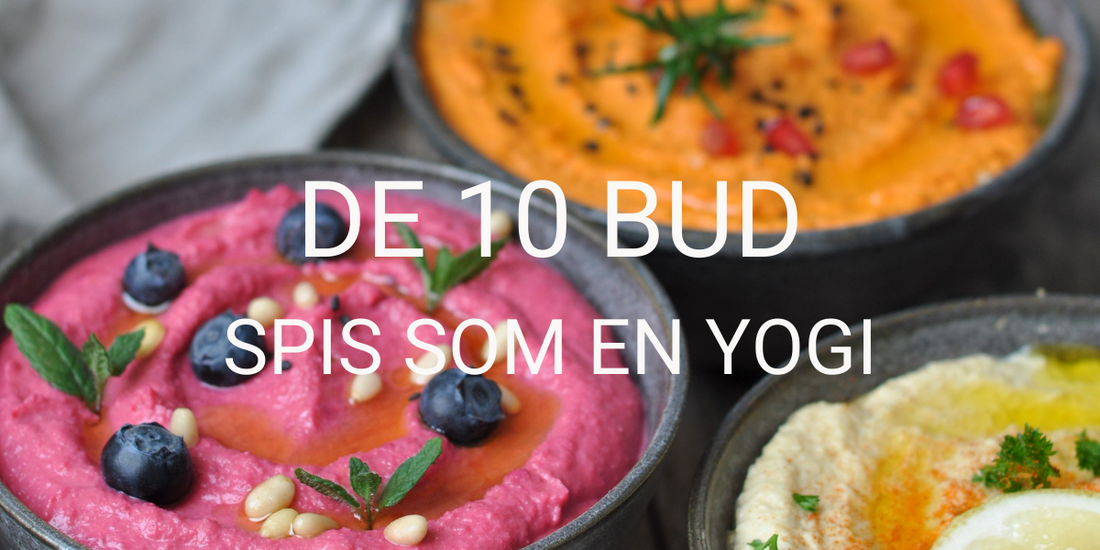- To you from Katrine Tuborgh & GOYOGI.
Accepting ourselves for who we are and who we are not is one of the biggest challenges in life. As a yoga teacher, nutrition coach and through my own experience, I often witness the "I'm not good enough" struggle. Among other things manifested through overeating or no eating at all and of course everything in between – but often with some kind of difficult relationship with the way we eat. The pressure for perfection is usually not about the food itself. Rather, our relationship with food is often symptomatic of things we feel we lack, want or cannot define in our lives. Food becomes a means of soothing or extinguishing our inability to access and heal difficult thoughts and feelings.
As humans, we are not always able to directly identify the source of our pain or “I'm not enough” feelings, nor do we often know how to process unpleasant feelings. We only know that we feel bad because of stress, painful memories and negative thought patterns, and in that moment food can be a comfort.
Striving for perfection in various areas of our lives can sometimes lead us to develop disadvantageous eating habits such as to starve ourselves. For many years this has been my own strategy for, without success, achieving peace with my body or my mind. Often we need and want to control circumstances - either past, present or future - and use food as a mechanism for this control. Developing a mindful eating practice and at the same time creating a healthier relationship with food by steering away from notions of a "perfect" diet can be very beneficial, and personally I have greatly enjoyed this.

Another expression of how our eating habits reflect our desire to be perfect is overeating. For many of us, the feeling of "I'm not good enough" is lowered by overeating. Dangerous nutritional beliefs such as "food makes me fat" or "food is the enemy" send a negative message that we do not deserve nourishment and create a stress response. These toxic thoughts can affect a cycle of undereating and then overeating later in the day because the body has been denied what it needs: nutrition. Binge eating to soothe negative emotions is a complicated situation. Again, there are no quick fixes, but slowing down and being present when we eat is a strategy that can help us cultivate a more relaxed relationship with food.
The media's portrayal of beauty can further encourage feelings of “not enough” by sending us a message that food is dangerous. Food is wonderful nourishment and our bodies are wired for the joy of satiety. But when we receive distorted images of beauty—which unfortunately become part of our mental and emotional landscape—it can exacerbate the negative relationship we have with food.
As society becomes more aware of the stressors of modern life, many of us are increasingly recognizing the need to start a yoga practice. Yoga's popularity continues to rise and it is becoming common knowledge that asanas (yoga poses), pranayama (breathing) and meditation all help relieve stress. These methods of becoming aware of your thought patterns can help you uncover inner discomfort, as well as how you hide from your pain. I would venture to say; eating like a yogi can help you reconnect with yourself and heal the emotions that create a negative eating pattern. It is not a magic spell, but like the practice of yoga, a journey that never ends.

Sometimes you may find that your practice does not make difficult or uncertain feelings disappear, but rather makes you more aware of what is going on in and around you. We often need to access the pain we already feel in order to fully understand where and how to take care of ourselves. How can you be curious about your pain, stop punishing yourself with food and start treating your feelings if you often don't even know what the real problem is? A regular mindful practice around your diet can be a beacon that guides you towards self-knowledge. It can be a messenger and guide informing you of the reality of what you are feeling and you can use this knowledge to create positive changes in your life.
By developing new perspectives, you can let go of old habits and patterns that no longer serve you. You may also find that exploring yourself is so much more gratifying than working towards perfection. When you choose to explore your thoughts, feelings, relationships and entire existence, the possibilities in your life become endless.

Instead of seeking perfection - try this: slow down, connect with your breath, pay attention to your body and let the study speak to you. Before you start eating, take a deep breath. Set an intention to explore your meal with all your senses. Perhaps this exploration will satiate you in a way you have never experienced before. Being present right now with your meal, present with what you're feeling in the moment, will set you on the right course for a more honest path to self-discovery and healing.
Without changing your diet, you can easily and simply change your eating pattern and become healthier in an instant. Does that sound good? It is. Does it sound easy? It is up to you to decide.
Mindful eating is a practice that is about choosing food that both satisfies your taste buds and nourishes your body. It is basically deeply rooted in Buddhist teachings. It helps you develop an understanding of and an acceptance of your natural reactions to food (likes, dislikes) without judgement, as well as being aware of your physical feelings such as hunger or fullness. Mindful eating encourages you to fully surrender to the experience of eating. A further possibility is to give attention to and recognition of where the food comes from. An essential exercise when practicing Mindful eating. This can allow you to come to a deeper appreciation and respect for your food.
These small and not particularly time-consuming changes can get you on the right track. Remind yourself that this is NOT about a diet or what ingredients you eat, but about the way you eat your meals.

Here you get ten suggestions from me. Take one, take two or take all ten. Take up the challenge. Start with your next meal and see how it changes your experience of shopping, preparing and eating it.
GRATITUDE
There is no getting around gratitude if you want to imitate a yogi. Therefore, this is of course the first point. So before you dive in
in your meal. Take a moment of gratitude. Whether you are thanking whoever prepared your meal, a god, a gardener, a greengrocer,
a supermarket, the hands that have sown, watered and fertilized, the animal that has lived, cosmic creation or perhaps most importantly; yourself - so just remember to be THANKFUL for your food. Gratitude is the first step on the road to true contentment and also to realizing how much you have. Recognize that you are a lucky ass
and say it with pride. Loud or soft. THANKS!
CHOOSE YOUR FOOD CAREFULLY
Your body is your temple. Treat your body like
you treat your most valued possessions: with care, respect and reverence. Choose natural, brightly colored foods that are easy to digest and grown with care whenever possible. It's about the fuel you put in your machine. For your beautiful, unique and fine body, only the best of the best is good enough.
EAT IN SILENCE
When it's quiet, it's natural
for the mind to wander. Acknowledge
your thoughts and then see if you can gently return to your experience of eating. Of course
mealtimes can be an important time to share the day, where the whole household comes together, so having an entire meal in silence can be impractical or just feel awkward. But even the first ones
five to ten minutes in silence can be refreshing and set a grateful tone for the rest of the meal. And when you eat alone, turn off your cell phone and other distracting factors.
EAT SLOWLY
Take a bite, chew it thoroughly, enjoy it, experience it and swallow it before taking the next bite. This is mindful eating. Be present and give each mouthful your full attention. Chew your food many times. To
your body needs to absorb what you put into it, you have to chew it first. Breathe, be present, chew (that's your new eating mantra). If you don't chew your food thoroughly, your stomach has to do so much more work.
they and it will leave you tired and bloated.
POWER OFF
Have you ever looked away from your phone or computer only to wonder where all the food went? These distractions make you less aware of what and how much you eat. They steal your attention and your opportunity to get to know your body better.
SIT DOWN
Don't eat on the go unless absolutely unavoidable. Sit down.
You're less likely to appreciate your food when you're trying to multitask. Mono-task your way through your meals. It is also difficult to keep an eye on how much you eat or to feel whether you are still hungry when you are eating on the go.
USE YOUR SENSES
Eating is a sensory experience, so go into it, take your sense of touch seriously here. Take the time to feel the texture, temperature, taste and weight of your food. Listen to the sound of you chewing. Smell it, look at it, see its glory. It's about paying attention and connecting with what you're doing and fully appreciating the moment as often as you can. I recommend that you share these thoughts with your loved ones and possibly colleagues so they don't think you've gone completely bananas when you start a slow-motion love affair with your lunch.
APPEARANCE AND DECORATIONS
Resist the temptation to eat straight from the bag, pan, pot or box. It's easier to see how much you're eating, and you'll often eat less because you appreciate your food more when it's nicely arranged on a plate. See page 28 for suggestions on how you can make your plate look inviting simply and without the big chef's skills.
REFLECT
Before you start cooking or reach for food in your fridge, take a moment to reflect on how you feel. Are you in a hurry? Stressed out? Sad? Are you bored? Hungry? What are your wants and what are your needs? Distinguish between the two. After taking a moment to reflect, you can choose whether to eat, what to eat and how to eat.
BREATHE
Breathe mindfully while eating. Take breaks, deep breaths and long exhales.

You can order Katrine's wonderful book right here at GOYOGI.
GO BE A YOGI - EVERYDAY
Namaste.



